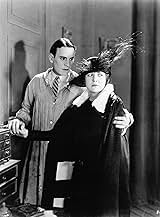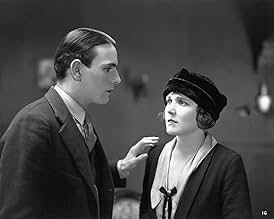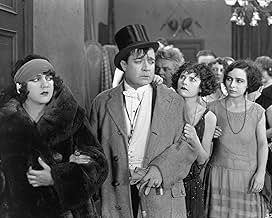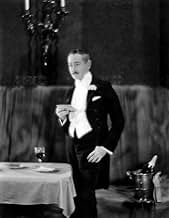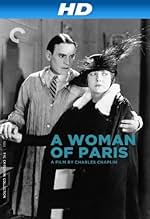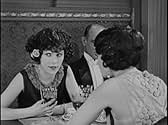CALIFICACIÓN DE IMDb
6.9/10
6.6 k
TU CALIFICACIÓN
Una mujer mantenida se encuentra con su exprometido y se encuentra dividida entre el amor y el confort.Una mujer mantenida se encuentra con su exprometido y se encuentra dividida entre el amor y el confort.Una mujer mantenida se encuentra con su exprometido y se encuentra dividida entre el amor y el confort.
- Premios
- 3 premios ganados en total
Charles K. French
- Jean's Father
- (as Charles French)
Nellie Bly Baker
- Masseuse
- (sin créditos)
Henry Bergman
- Head Waiter
- (sin créditos)
Charles Chaplin
- Station Porter
- (sin créditos)
Frank Coghlan Jr.
- Boy
- (sin créditos)
Antonio Corsi
- Accordion Player
- (sin créditos)
Harry d'Abbadie d'Arrast
- Man in Nightclub
- (sin créditos)
Stella De Lanti
- Revel's Fiancée
- (sin confirmar)
- (sin créditos)
Jean de Limur
- Man in Nightclub
- (sin créditos)
Charles Farrell
- Man in Nightclub
- (sin créditos)
Bess Flowers
- Mannequin
- (sin créditos)
- Dirección
- Guionista
- Todo el elenco y el equipo
- Producción, taquilla y más en IMDbPro
Opiniones destacadas
This is an exquisite film that needs to be seen with some understanding of the era in which it was made. It was a critical success for good reason, and it's ironic style and subtle acting was a great influence on directors such as Lubitsch. It was not a popular success in the US but was well understood and acclaimed as such in Europe. I notice that some reviewers decry it as melodrama, but there is no reason why melodrama should not be an acceptable form of art. I would urge viewers to immerse themselves more in the treasures of the silent cinematic era, as there are many lessons to be learned therefrom for today's aspiring artists in any medium.
A melodrama rather than the saucy Parisian comedy the title and the name of Charles Chaplin suggests. Promptly withdrawn by its creator, 'A Woman of Paris' was for over half a century one of those films whose reputation was based upon it's unavailability for reappraisal and like many of Chaplin's later films was to prove a disappointment when it was finally revived in the 1970s.
Both the plot and the wardrobe worn by Chaplin's leading lady Edna Purviance evokes the era of Chaplin's fellow United Artist D. W. Griffith rather than the continental sophistication suggested by the title, while the presence of Adolphe Menjou happily anticipates the nascent sophistication of the twenties.
Both the plot and the wardrobe worn by Chaplin's leading lady Edna Purviance evokes the era of Chaplin's fellow United Artist D. W. Griffith rather than the continental sophistication suggested by the title, while the presence of Adolphe Menjou happily anticipates the nascent sophistication of the twenties.
If nothing else, you have to give Charlie Chaplin a lot of credit for taking a shot at something so different from his usual fare. (Though he himself only appears on-screen for a few seconds this time, he did almost everything else in the production.) And while "A Woman of Paris" is certainly a cut below his comedy features, it's a pretty good melodrama, and you'd have to think that with experience Chaplin could have gone on to become almost as effective with straight melodrama as he was with his sentimental comedies. It's not really surprising that after this he returned to comedy for good, but that was just to keep audiences happy, not because he couldn't do drama, since this is a decent effort.
Chaplin's own frequent lady Edna Purviance is convincing as the young woman whose tangled love affairs pull her away from her true love and into a set of tangled relationships in the empty, decadent world of the Parisian idle classes. Except for being rather contrived - there are far too many coincidences and pat developments in the plot, and they do not work as well in serious drama as they would in a comedy - the story is interesting and fairly creative. It does get a bit heavy at times, since there is very little comic relief, but Adolphe Menjou helps keep it from getting unbearably serious with a good performance as the carefree, irresponsible Pierre. He shows that even without dialogue he can make this kind of character lively and memorable.
Since it doesn't quite measure up to the standard of either the best Chaplin features or the best silent melodramas, "A Woman of Paris" may not have a niche of its own, except for its historical interest. But it's quite an interesting change of pace from Chaplin, and an above average movie that's worth seeing.
Chaplin's own frequent lady Edna Purviance is convincing as the young woman whose tangled love affairs pull her away from her true love and into a set of tangled relationships in the empty, decadent world of the Parisian idle classes. Except for being rather contrived - there are far too many coincidences and pat developments in the plot, and they do not work as well in serious drama as they would in a comedy - the story is interesting and fairly creative. It does get a bit heavy at times, since there is very little comic relief, but Adolphe Menjou helps keep it from getting unbearably serious with a good performance as the carefree, irresponsible Pierre. He shows that even without dialogue he can make this kind of character lively and memorable.
Since it doesn't quite measure up to the standard of either the best Chaplin features or the best silent melodramas, "A Woman of Paris" may not have a niche of its own, except for its historical interest. But it's quite an interesting change of pace from Chaplin, and an above average movie that's worth seeing.
Charles Chaplin is noted for his comedy performances, and deservedly.
His direction, though, should be more highly regarded, if only for this one motion picture.
Compare the quality of the photography and the smoothness of the editing to, for example, "The Gold Rush," of about the same time.
"A Woman of Paris" is very modern; "The Gold Rush" is downright primitive (but, in spots, brilliant).
"A Woman of Paris" also shows some admirable acting talent in, really, all the players. Some of the lesser characters are still played beautifully, despite being "lesser," especially Marie's maids and her, more or less, friends, and very especially the masseuse.
And the scene where the artist's mother, played by Lydia Knott, bent on revenge, comes upon Marie -- with no words, just body movement and facial expression -- she tells the audience what the proverbial thousand words could not so well.
Credit for part of that good acting must, of course, go to the director, but even the best director can't make much of poor actors.
Chaplin had very good actors. Adolphe Menjou reached stardom, and deservedly. What a tremendous talent; he could do everything.
Edna Purviance should have achieved much more acclaim. She performed admirably, especially in this movie, and she was attractive. Fame is certainly fickle.
In some ways, "A Woman of Paris" might be written off by a few as "soap opera." But it is well worth watching for the performances and, especially, for the directing.
His direction, though, should be more highly regarded, if only for this one motion picture.
Compare the quality of the photography and the smoothness of the editing to, for example, "The Gold Rush," of about the same time.
"A Woman of Paris" is very modern; "The Gold Rush" is downright primitive (but, in spots, brilliant).
"A Woman of Paris" also shows some admirable acting talent in, really, all the players. Some of the lesser characters are still played beautifully, despite being "lesser," especially Marie's maids and her, more or less, friends, and very especially the masseuse.
And the scene where the artist's mother, played by Lydia Knott, bent on revenge, comes upon Marie -- with no words, just body movement and facial expression -- she tells the audience what the proverbial thousand words could not so well.
Credit for part of that good acting must, of course, go to the director, but even the best director can't make much of poor actors.
Chaplin had very good actors. Adolphe Menjou reached stardom, and deservedly. What a tremendous talent; he could do everything.
Edna Purviance should have achieved much more acclaim. She performed admirably, especially in this movie, and she was attractive. Fame is certainly fickle.
In some ways, "A Woman of Paris" might be written off by a few as "soap opera." But it is well worth watching for the performances and, especially, for the directing.
Finally saw Woman of Paris: this was a legendary film in its day, but mostly because it was virtually never re-released for sixty years after it premiered in 1923, so the legend grew in its absence. The parts of the story that were not told would have made a better movie than the movie, for example why the lovers' fathers at the beginning of the film are against the marriage, and how Marie (Edna Purviance) became a (shudder) "Woman of Paris" during the year following her departure from her fiance. So I didn't buy the story but the camera work and editing do marvelous things with the story that is there. The melodramatic climax is a bit much to be believed, but not comical as a lot of silent mellers appear today. A little D.W. Griffith (sophisticated early use of photography to tell story and set mood), a little Tolstoy ("bad woman" story contrasted with storyteller's emphasis on happy marriages and wholesome family life), a touch of Dreiser ("sinful" characters shown with realistic insight) and I'd guess a soupcon of Terrence Ratigan (sophisticated attitudes) but I doubt he was around then. The ad copy for this film says Chaplin has a cameo as a railway porter but I didn't notice one in the train scene: I suspect instead he was the ticket agent whose hand appears pointing out the ticket window toward the train. Altogether a satisfying and entertaining film, but the story would have been better if Chaplin had worked on it a little longer.
¿Sabías que…?
- TriviaThe reissue of this film, with a musical score and new cut by Sir Charles Chaplin, was the last work of his entire film career. By then, the 87-year-old Chaplin was visibly frail but still walking. His score was aided by arranger Eric James, and he took a small theme from Monsieur Verdoux, el moderno Barba Azul (1947), but most of the score was Chaplin's. The film was reissued posthumously in 1977 with the new score to overwhelming critical and public praise. At that time, many critics praised it (as in the trailer) as one of the best films ever made.
- ErroresWhen Jean starts fighting with Pierre in the restaurant, Pierre's glass of wine or champagne gets knocked over. When Pierre sits down on the table afterwards, the glass stands on the table filled with drink as if it hadn't been knocked over.
- Citas
[Intertitle]: Time heals, and experience teaches that the secret of happiness is in service to others.
- Versiones alternativasDuring 1976, Chaplin was preparing a reissue of A Woman of Paris/Sunnyside but died before completion. The project was completed after his death, and the films were reissued in the United States by Kino International Corp. in 1978. This version, however, dispensed with an opening subtitle, as well as a few brief insert shots.
- ConexionesFeatured in Chaplin Today: Modern Times (2003)
Selecciones populares
Inicia sesión para calificar y agrega a la lista de videos para obtener recomendaciones personalizadas
- How long is A Woman of Paris: A Drama of Fate?Con tecnología de Alexa
Detalles
- Fecha de lanzamiento
- País de origen
- Sitio oficial
- Idioma
- También se conoce como
- A Woman of Paris: A Drama of Fate
- Locaciones de filmación
- Productora
- Ver más créditos de la compañía en IMDbPro
Taquilla
- Presupuesto
- USD 351,000 (estimado)
- Total a nivel mundial
- USD 12,921
- Tiempo de ejecución1 hora 22 minutos
- Mezcla de sonido
- Relación de aspecto
- 1.33 : 1
Contribuir a esta página
Sugiere una edición o agrega el contenido que falta

Principales brechas de datos
By what name was Una mujer de París (1923) officially released in India in English?
Responda
